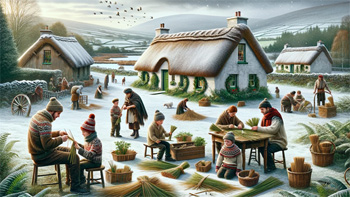 St. Brigid's Day in Ireland
St. Brigid's Day in Ireland


St. Brigid's Day, celebrated on February 1st, is a significant day in Ireland, marking the beginning of spring and honoring one of the country's most beloved patron saints, Saint Brigid of Kildare. Known in the Irish language as "Lá Fhéile Bríde," this festival intertwines Christian traditions with ancient Celtic rites, embodying the rich tapestry of Irish cultural heritage. St. Brigid's Day is not only a religious observance but also a celebration of Irish folklore, nature, and the arrival of the brighter days of spring. In this article, we delve into the origins, customs, and modern-day celebrations of St. Brigid's Day in Ireland.
The Origins of St. Brigid's Day
St. Brigid's Day has its roots in both Christian and pagan traditions. Saint Brigid, born in the 5th century, is one of Ireland's three patron saints, along with Patrick and Columba. She founded several monasteries, the most famous being in Kildare. Her connection to the Celtic festival of Imbolc, which celebrates the beginning of spring, intertwines her story with older, pre-Christian traditions. Imbolc, traditionally observed on February 1st, heralds the start of the lambing season and the awakening of life after the winter.
Traditional Celebrations and Customs
One of the most enduring customs of St. Brigid's Day is the creation of St. Brigid's Crosses. These crosses, made from rushes or reeds, are said to protect the home from harm and are traditionally crafted on the eve of St. Brigid's Day. In some regions, people also make a 'Brideog' (a small Brigid doll), which is carried from house to house, with songs and prayers for blessings. Families often leave a piece of cloth or ribbon outside for Brigid to bless as she passes by, believed to have powers of healing and protection.
St. Brigid's Day and Irish Folklore
St. Brigid's Day is steeped in Irish folklore and tradition. The saint herself is often associated with the pagan goddess Brigid, who was a figure of fertility and a guardian of agriculture and livestock. Tales and legends of St. Brigid's miracles and kindness are widespread in Irish culture, often emphasizing her connection to the natural world and her role as a protector and healer.
Modern Celebrations
In modern Ireland, St. Brigid's Day is celebrated with various events and activities. Parades, festivals, and workshops are held, where people can learn to make St. Brigid's Crosses and partake in traditional music and dancing. Schools and community groups often organize events to educate about the life and legacy of Saint Brigid. Religious services are also held, with special prayers and blessings, reflecting the enduring spiritual significance of this day.
St. Brigid's Day and the Irish Diaspora
St. Brigid's Day is also an important day for the Irish diaspora, serving as a link to their ancestral culture and heritage. Irish communities around the world celebrate this day, keeping alive the traditions and customs of their homeland. These global celebrations highlight the universal appeal of St. Brigid's message of kindness, charity, and hope.
St. Brigid's Day in Ireland is a celebration of the country's rich spiritual heritage, its ancient customs, and the natural beauty of its landscape as it awakens to spring. From the weaving of crosses to the storytelling and feasting, this day encapsulates the essence of Irish tradition and the enduring legacy of one of its most cherished saints. As a time of renewal and hope, St. Brigid's Day holds a special place in the hearts of the Irish people, symbolizing the intertwining of their Christian and Celtic roots.